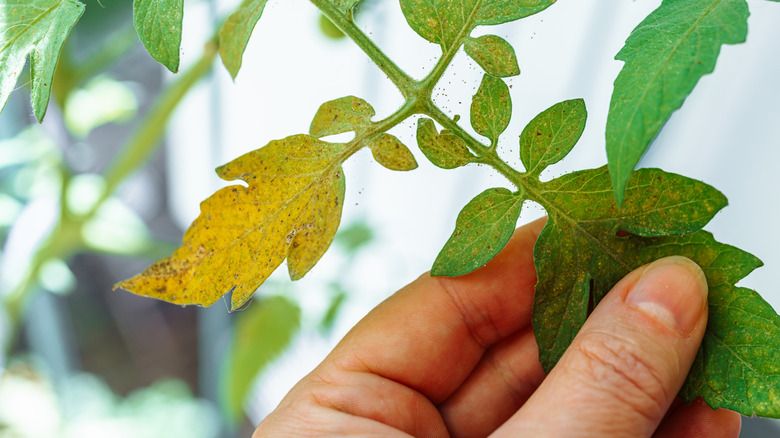The Delicious Herb That Can Act As A Natural Pest Repellent For Tomato Plants
Tomato plants (Solanum lycopersicum) are arguably commonplace in home gardens, as many people are attracted to the idea of having access to the fruit on their own property rather than buying it from the store. If you're getting ready to plant them, you'll certainly want to review these tips for growing the best tomatoes in your garden. Aside from providing tomato plants with ideal growing conditions, you'll also need to stay on top of pest management. One possible way to control certain pests around tomatoes is to plant specific herbs such as chives (Allium schoenoprasum).
Chives are perennial plants that technically belong to the onion (Alliaceae) family. There are several types of herbs you should consider growing near tomatoes in the garden, with chives being among them. As companion plants, it's thought that chives may help reduce the risk of certain pests to help other plants like tomatoes thrive. They can be harvested once the leaves grow 6 inches long, and you can either use them in recipes immediately or freeze them to use at a later date. What's more, when chives are allowed to bloom, they produce beautiful lavender-colored flowers in the spring and summer months, which can support a range of bees and other pollinators in your garden, too. Be aware that these plants can also grow up 10 to 12 inches tall.
What you need to know before planting chives to control pests around tomato plants
When considering natural forms of pest control for your tomatoes, it's thought that chives might help due to their pungent odor, which may be off-putting to certain pests. In fact, this easy-to-grow herb can help your cucumber plants thrive in the garden in a similar way. While chives may not repel all pests around your tomatoes, it's thought that the plant may be particularly helpful in reducing aphid and spider mite infestations. Just keep in mind that such results of companion planting are not 100% guaranteed, and you will likely need to utilize other pest control management techniques for your tomatoes. Also, chives may not protect against other common types of tomato pests, such as stink bugs, fruit worms, whiteflies, and hornworms.
Before planting chives near tomato plants, be aware that these herbs grow best in USDA Hardiness Zones 3 through 9. They also like full sun, as well as moist, well-draining soil, though they are also considered drought-tolerant. If you do decide to plant chives as companion plants for tomatoes, you don't necessarily have to place them directly next to your tomato plants. You may still see benefits when planting chives a row apart from tomatoes, or even in a small bed near them.

